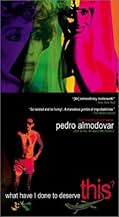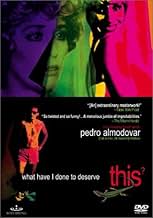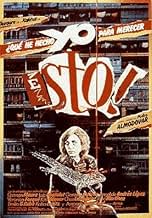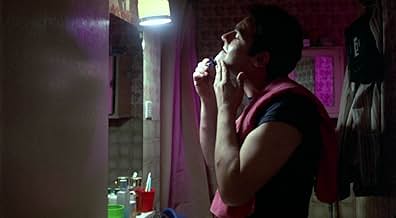IMDb-BEWERTUNG
7,1/10
11.816
IHRE BEWERTUNG
Füge eine Handlung in deiner Sprache hinzuThe vicissitudes of Gloria, a neurotic housewife, and her family's peculiar characters.The vicissitudes of Gloria, a neurotic housewife, and her family's peculiar characters.The vicissitudes of Gloria, a neurotic housewife, and her family's peculiar characters.
- Auszeichnungen
- 5 Gewinne & 1 Nominierung insgesamt
Gonzalo Suárez
- Lucas Villalba
- (as Gonzalo Suarez)
Ángel de Andrés López
- Antonio
- (as Angel de Andres-Lopez)
Kiti Mánver
- Juani
- (as Kiti Manver)
Sonia Hohmann
- Vanessa
- (as Sonia Anabela Holimann)
Pedro Almodóvar
- Play-Back 'La bien pagá'
- (as Almodovar-McNamara)
Fabio McNamara
- Play-Back 'La bien pagá'
- (as Fany Mc Namara, Almodovar-McNamara)
Miguel Ángel Herranz
- Miguel
- (as Miguel Angel Herranz)
Empfohlene Bewertungen
This is certainly one of Almodovar's best movies. It has more than the average movie and is actually life as it is on many occasions. The thin but very subtle humor in all of his movies and the personages in the movies make him a master director who knows what's going on in life at the moment of making a film. Very much it is story about people living together but don't know each-other. With slices of sex, drugs, addiction, humor he brings you to a thin laugh although most problems in the movie are real problems and aren't to be taken lightly. A film of making choices in life and go further and stand with this choices, and keep on smiling and hoping whatever happens.
I loved this. It isn't so great compared to later projects where he knows how to use knives instead of chalk. And he decides to understand women, instead of understanding their luggage.
But this is better in a way because you can see the man, what a friend calls the exposed plumbing of what later would become a polished structure.
Stories in Almodovar's soul, that wonderful soul, appear first as images that only after they crack their shells into the fluttering wind of sight do they loose into their narrative trajectory. Sight first, then narrative. But because the narrative comes directly from the cinematic, it flows with an unusual naturalness. It drives into complexities, even emotion depths. It becomes surreal in places, but it all seems natural because it flows from the image within.
And that gives us another advantage. Nearly all films about love and women begin all their major strokes from the written or spoken word and the situations that grow out of them. That means in film that we are stuck with a limited vocabulary and set of patterns that not only dull with repetition, but aren't cinematic at root.
Even in this early film, you can see that because these eyesweets were never touched by pen, they are all fresh without leaving what we accept as true. Its quite an achievement.
The standout performance? A ten year old redhead with "powers," and around whom everything happens. She may be the cause.
Ted's Evaluation -- 3 of 3: Worth watching.
But this is better in a way because you can see the man, what a friend calls the exposed plumbing of what later would become a polished structure.
Stories in Almodovar's soul, that wonderful soul, appear first as images that only after they crack their shells into the fluttering wind of sight do they loose into their narrative trajectory. Sight first, then narrative. But because the narrative comes directly from the cinematic, it flows with an unusual naturalness. It drives into complexities, even emotion depths. It becomes surreal in places, but it all seems natural because it flows from the image within.
And that gives us another advantage. Nearly all films about love and women begin all their major strokes from the written or spoken word and the situations that grow out of them. That means in film that we are stuck with a limited vocabulary and set of patterns that not only dull with repetition, but aren't cinematic at root.
Even in this early film, you can see that because these eyesweets were never touched by pen, they are all fresh without leaving what we accept as true. Its quite an achievement.
The standout performance? A ten year old redhead with "powers," and around whom everything happens. She may be the cause.
Ted's Evaluation -- 3 of 3: Worth watching.
I found myself wrapped up in this off-beat movie, off-beat that is, for anyone but Almodóvar in the mid 1980s. For him, this one was sort of tame. It's populated by an Almodovaran crowd of demimonde, and struggling proletarians and intellectuals. Some take drugs to get by, some sell drugs but won't take them. Sex is a commodity, and honor a dubious value. The struggle to survive in a harsh urban environment ought not be as comic as this often is, so it's not surprising when Almodóvar brings a little emotional sustenance to leaven the pessimism. But nobody in this film should be taken at face value, least of all the director, and nothing should be taken too seriously. It's fun, and in the end, that's enough.
By far not my best Almodovar film, but it is a winner as is! The more films I get to see from this one-of-a-kind (as all pioneers!) director, the more I love his work.
In this 4th film of his, he starts out with his usual absurd, peculiar humour and his trademark hilarious characters. If you have seen any of these other films of his: 'Pepi, Luci, Bom and Other Girls on the Heap', 'Labyrinth of passion', 'Kika', 'Matador', 'Women on the Verge of a Nervous Breakdown' plus more, you know what to expect. Almodovar humour is unique and it's here. The big difference in this one is that from a point and on, Almodovar fits in a sad tone, slowing the pace down and converting the film to a drama half-way - despite the fact he does not leave out some humour element - in this very special Almodovar way.
I suppose this should do also for people who didn't like half of Almodovar films (the more offensive ones), maybe because things are more serious in this or maybe because one can distinguish the director's point more easily than in other, more hillariously absurd, almost surreal ones.
In this 4th film of his, he starts out with his usual absurd, peculiar humour and his trademark hilarious characters. If you have seen any of these other films of his: 'Pepi, Luci, Bom and Other Girls on the Heap', 'Labyrinth of passion', 'Kika', 'Matador', 'Women on the Verge of a Nervous Breakdown' plus more, you know what to expect. Almodovar humour is unique and it's here. The big difference in this one is that from a point and on, Almodovar fits in a sad tone, slowing the pace down and converting the film to a drama half-way - despite the fact he does not leave out some humour element - in this very special Almodovar way.
I suppose this should do also for people who didn't like half of Almodovar films (the more offensive ones), maybe because things are more serious in this or maybe because one can distinguish the director's point more easily than in other, more hillariously absurd, almost surreal ones.
One thing about Pedro Almodovar's films is that they are never boring. Another is that women do whatever they need to do to get by. This film is no different and it is almost as if he followed the theme here with Volver. In fact, the star of this film, Carmen Maura, is also in Volver.
Gloria (Carmen Maura) does whatever she needs to do to get by, whether it is popping No-Doze or sniffing glue. She works constantly to provide for her family, as her no-good husband (Ángel de Andrés López) is not pulling his weight.
One son sells dope and the other likes to have sex with his friend's fathers. Grandma (Chus Lampreave) sits around talking about the village.
Her best friend Cristal (Verónica Forqué - Matador) is a prostitute.
Almodovar presents an upside down world where everything is exaggerated. This is a thinking man's movie. You really have to pay attention to get it. That is not to say it is not enjoyable, but you miss a lot by not fully participating.
You notice that Cristal is a lot more mentally healthy that Gloris; that her son is not a victim, but in charge of his sexuality; and there is enough other things going on to really keep you interest.
Almodovar is never boring.
Gloria (Carmen Maura) does whatever she needs to do to get by, whether it is popping No-Doze or sniffing glue. She works constantly to provide for her family, as her no-good husband (Ángel de Andrés López) is not pulling his weight.
One son sells dope and the other likes to have sex with his friend's fathers. Grandma (Chus Lampreave) sits around talking about the village.
Her best friend Cristal (Verónica Forqué - Matador) is a prostitute.
Almodovar presents an upside down world where everything is exaggerated. This is a thinking man's movie. You really have to pay attention to get it. That is not to say it is not enjoyable, but you miss a lot by not fully participating.
You notice that Cristal is a lot more mentally healthy that Gloris; that her son is not a victim, but in charge of his sexuality; and there is enough other things going on to really keep you interest.
Almodovar is never boring.
Wusstest du schon
- WissenswertesVictoria Abril turned down the role of Cristal, as she didn't want to play another prostitute, having just played one recently.
- VerbindungenFeatured in The Story of Film: An Odyssey: European New Wave (2011)
Top-Auswahl
Melde dich zum Bewerten an und greife auf die Watchlist für personalisierte Empfehlungen zu.
- How long is What Have I Done to Deserve This??Powered by Alexa
Details
Box Office
- Weltweiter Bruttoertrag
- 690 $
- Laufzeit
- 1 Std. 41 Min.(101 min)
- Sound-Mix
- Seitenverhältnis
- 1.85 : 1
Zu dieser Seite beitragen
Bearbeitung vorschlagen oder fehlenden Inhalt hinzufügen

![Tráiler [OV] ansehen](https://m.media-amazon.com/images/M/MV5BYTM3Y2Q4NTMtZDZmZC00M2E3LWE2ZmQtZWQzM2Q4NjIyNWU1XkEyXkFqcGdeQXRyYW5zY29kZS13b3JrZmxvdw@@._V1_QL75_UX500_CR0)

































